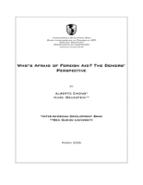Who's Afraid of Foreign Aid?: The Donors' Perspective
Date
Mar 2006
Since efforts by industrial countries to increase the amount of foreign aid they provide have been on the rise recently, it is important to understand the determinants involved. This paper examines the factors affecting support for foreign aid among voters in donor countries. The theoretical model, which considers an endogenous determination of official and private aid flows, suggests that government efficiency is an important factor in this regard, and also ties individual income to aid support through the elasticity of substitution. An empirical analysis of individual attitudes, based on the World Values Surveys, reveals that two factors are positively related to an individual's willingness to support foreign aid: satisfaction with own government performance and individual relative income. Furthermore, when using donor country data, we find that aid is negatively tied to inequality, corruption and taxes. These results are quite consistent with the analytical framework.



